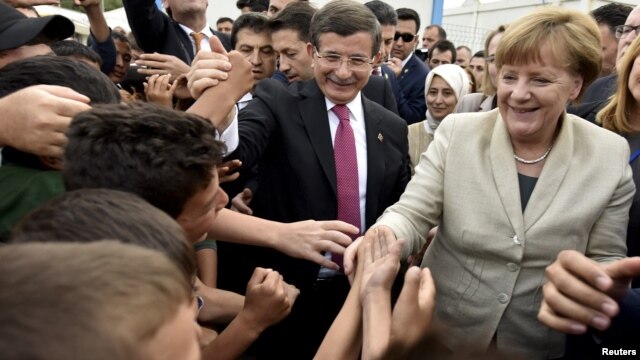Merkel visits refugees in Turkey, discusses migrant crisis
| Publisher | Radio Free Europe/Radio Liberty |
| Publication Date | 23 April 2016 |
| Cite as | Radio Free Europe/Radio Liberty, Merkel visits refugees in Turkey, discusses migrant crisis, 23 April 2016, available at: https://www.refworld.org/docid/576900536.html [accessed 29 May 2023] |
| Disclaimer | This is not a UNHCR publication. UNHCR is not responsible for, nor does it necessarily endorse, its content. Any views expressed are solely those of the author or publisher and do not necessarily reflect those of UNHCR, the United Nations or its Member States. |
April 23, 2016
By RFE/RL
 Turkish Prime Minister Ahmet Davutoglu and German Chancellor Angela Merkel greeted by refugees at the Nizip refugee camp on April 23.
Turkish Prime Minister Ahmet Davutoglu and German Chancellor Angela Merkel greeted by refugees at the Nizip refugee camp on April 23.
German Chancellor Angela Merkel traveled to a Turkish refugee camp ahead of talks with Turkey's prime minister aimed at defusing the ongoing migrant crisis.
Merkel and top European Union officials were greeted with flowers as they entered the camp in Nizip, near Turkey's border with Syria, on April 23. The government-run camp is home to roughly 5,000 Syrian refugees.
After the visit, Merkel, EU Council President Donald Tusk, and European Commission Vice President Frans Timmermans were due to discuss the migration crisis and a 6 billion euro ($6.7 billion) agreement with Turkish Prime Minister Ahmet Davutoglu.
Turkey reached the deal with European leaders earlier this year to receive thousands of migrants from the Greek islands. It was coupled with border closures in Europe that meant smugglers could not secure passage to northern European states.
That initially slowed the numbers of new arrivals to Greece sharply. But boats have been arriving with about 150 people a day, indicating the "hermetic sealing" of the route appears to be over, migration officials said.
In the city of Gaziantep, the capital of the province that borders on Islamic State-controlled Syrian territory, security was extremely tight, with uniformed and plainclothed police officers patrolling in force.
TV footage showed Davutoglu and local officials, as well as children holding flowers, greeting Merkel at the airport. Other footage showed Tusk disembarking from his official plane and being greeted by dignitaries.
A poster depicting Merkel's face and the words "Solidarity with the migrants. We are proud of our Chancellor Angela Merkel and Prime Minister Ahmet Davutoglu," in German, could be seen in town.
Earlier in the week, Turkey's foreign minister said the European Union needed to be more pragmatic in releasing the cash meant to help manage the migrant crisis, saying there were problems with the delivery of the money.
Merkel also faces domestic criticism for allowing a German comedian to be prosecuted for insulting Turkish President Recep Tayyip Erdogan.
Another side of the bargain used to sell the migrant deal to the Turkish public, was Turks winning quicker visa-free travel to Europe. That issue could now could go unfulfilled, at least by a June deadline.
The influx of millions of migrants fleeing war in Syria or poverty in the Middle East and North Africa has sorely tested EU solidarity, as leaders struggle to come up with a response acceptable across the 28-member bloc.
About 2.7 million refugees are now living in Turkey alone.
The deal with Turkey has been fiercely criticized by United Nations refugee and rights groups as immoral and a violation of international humanitarian law.
Human Rights Watch said Merkel's delegation instead should be visiting a detention center "for people who were abusively deported from Greece."
Amnesty International urged the European delegation not to "close their eyes to the catalogue of human rights abuses faced by refugees" in Turkey.
With reporting by AP, AFP, Reuters, and dpa
Link to original story on RFE/RL website
